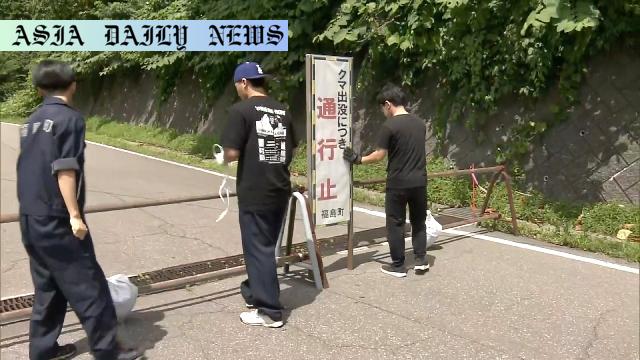Bear Attack: Police in Hokkaido patrol endlessly after a fatal brown bear attack, taking safety measures to protect residents.
A man in Hokkaido was killed by a brown bear during the early morning hours.
Authorities have issued safety alerts and restricted access in the area.
Experts are investigating to locate and deal with the bear responsibly.
Residents are urged to avoid outdoor activities during early mornings or evenings.

A Tragic Incident Shocks Fukushima Town
The tranquil town of Fukushima, located in the Mitake district of Hokkaido, Japan, experienced a devastating tragedy when a 52-year-old newspaper delivery man succumbed to a fatal brown bear attack. Witness accounts detailed the harrowing event, with police confirming the fatality after discovering the man in nearby bushes with multiple scratches and injuries. This tragic event underscores the unpredictable and dangerous nature of wildlife encounters in rural areas.
Authorities have been quick to respond to the situation, enforcing rigorous safety protocols. A pivotal measure has been the installation of barricades and signage, restricting access to specific areas prone to bear activity. This swift action is aimed at safeguarding residents while ensuring they remain vigilant against potential threats. Law enforcement officials are currently patrolling the area around the clock to reduce risks and provide reassurance to the local population.
Community Safety Comes First
The impact of this attack has extended to the daily routines of residents, especially children. Elementary and junior high school students are now being provided with transportation to and from school to minimize potential exposure to danger. Outdoor activities, such as physical education, have been temporarily suspended to prioritize safety.
In tandem with these immediate measures, experts from the Hokkaido Research Organization are set to conduct an in-depth survey of the area. By collecting and analyzing traces such as bear fur and saliva, authorities hope to identify and locate the problematic animal. This effort reflects a commitment to handling the situation responsibly while ensuring that the bear does not pose further threats.
Heightened Awareness and Caution
Following this tragic incident, local officials have issued advisories urging residents to exercise heightened caution. One major recommendation is to refrain from leaving garbage outside, as it can attract bears to residential areas. Residents are also advised to remain indoors during early morning and evening hours when brown bears are most active.
While the presence of brown bears in the region is not uncommon, fatal encounters such as this serve as alarming reminders of the potential dangers posed by wildlife. The gathering of experts, combined with active participation from the community, highlights the collective effort to restore a sense of security in Fukushima Town. The tragedy has fostered a stronger resolve among residents to coexist with nature while taking necessary precautions to avoid future incidents.
A Broader Perspective on Wildlife Management
The incident in Hokkaido raises important questions about wildlife conservation and human safety. As habitats shrink due to urban expansion and climate change, interactions between humans and wildlife become increasingly inevitable. To address such issues, authorities in affected regions must strike a delicate balance between protecting ecological diversity and ensuring public safety.
This approach requires robust policies that prioritize preventive measures, such as proper waste management, education on wildlife behavior, and infrastructure that minimizes human-wildlife conflicts. Local communities must remain informed and actively engaged in implementing these strategies. The tragic incident in Hokkaido serves as a stark reminder of the shared responsibility that exists between people and nature, emphasizing an urgent need for greater awareness and preparation.



Commentary
Reflections on the Hokkaido Bear Attack
The recent tragedy in Hokkaido involving a fatal bear attack is a sobering reminder of the challenges communities face when coexisting with wildlife. Brown bears, majestic yet potentially dangerous, are part of the natural ecosystem in northern Japan. However, incidents like this highlight the complex relationship between nature and humanity, where efforts to coexist require continuous vigilance and adaptability.
What stands out is the swift response from authorities and residents. The enforcement of safety measures, such as transportation for schoolchildren and restrictions on outdoor activities, showcases a proactive stance on protecting the community. Additionally, the collaboration with experts to study and locate the bear reflects a balance between addressing immediate threats and preserving wildlife responsibly. These combined efforts indicate a thoughtful approach to handling such crises.
The Importance of Awareness and Preparedness
Ensuring that residents are informed and prepared is a cornerstone of managing human-wildlife interactions. Simple measures, such as proper waste disposal and avoiding outdoor activities during peak bear activity hours, can significantly reduce the likelihood of encounters. Education plays a key role in fostering awareness, enabling communities to coexist with nature while minimizing risks.
However, this tragedy also underscores a broader issue: shrinking wildlife habitats due to urban development and climate change. As human expansion encroaches upon natural spaces, incidents like the one in Hokkaido may become more frequent. This calls for a reevaluation of how we manage shared spaces and protect both people and animals.
A Call for Sustainable Solutions
The Hokkaido bear attack serves as a poignant reminder of the importance of sustainable coexistence. Policymakers, conservationists, and local communities must work together to create strategies that prioritize safety without compromising ecological balance. This includes investing in technologies and infrastructures that deter wildlife from venturing into human settlements, alongside policies that protect natural habitats.
Ultimately, the tragedy in Fukushima Town calls for a renewed commitment to understanding and navigating the delicate balance between human activity and the natural world. By learning from this incident and implementing preventive measures, we can hope to foster a future where such tragedies become increasingly rare.